Source: umagazine
The mellow sound of music arises in the distance. Several students play their guitars by the lake, oblivious to the small crowd that has formed in front of them. Such scenes are observed increasingly often on the University of Macau (UM) campus, leading some observers to comment that UM has become a playground for young musicians.
The German philosopher Nietzsche once said, ‘Without music, life would be a mistake.’ The great Greek philosopher Aristotle once remarked, ‘Music has a power of forming the character, and should therefore be introduced into the education of the young’. It is widely acknowledged that music has the power to enrich people’s lives and nourish their mind and soul. But not everyone is born with musical talent. For most people, musical talent and skill needs to be cultivated, and one of the most important purposes of peer and community education at UM is to encourage students to pursue artistic interests outside their studies.
In this issue, we tell the stories of young musicians at UM, and look at how UM and the students work together to create a vibrant musical atmosphere on campus.
Promising Young Musicians
A girl stands by the lake, her eyes half-closed and her head tilted towards the viola she cradles in one arm. The bow in her right hand darts across the strings with a fluid motion, almost as if it has a life of its own. The violist is Ivy, a first-year student from the Faculty of Business Administration and a member of the UM String Orchestra. She has represented Macao at various events in Europe, the United States, and Asia.
The String Orchestra
Ivy obtained the Associated Board of the Royal Schools of Music’s (ABRSM) Grade 8 viola certification when she was in secondary school. She went on to win an award for her viola solo performance in the senior category at the Macao Young Musicians Competition 2014. After becoming a student at UM last year, she felt as if a new world opened for her, a world that gives her new musical inspiration. In high school, Ivy practiced five days a week at the Macao Youth Symphony Orchestra. Now, on the large new campus, there are many different locations where she can practice her viola. She has also discovered a lot of gifted student musicians at the String Orchestra.‘The orchestra was formed by students from different backgrounds, which gives us an opportunity to learn from each other and makes it more fun to practice together,’ Ivy says. Through the orchestra, she has met like-minded friends and has received guidance from senior members. Ivy hopes to bring more variety to the orchestra in terms of music styles. ‘Understanding and performing various styles of music can better prepare us for more opportunities that may arise in the future and make more people know us.’ she says.
An Uncommon Choice of Instrument
Not many children would choose to learn the viola. Ivy was the only one in her school to play this instrument. The strings of a viola are thicker than those of a violin, and therefore require more effort to play nicely, making the instrument an uncommon choice for young girls. For this reason, Ivy’s masterful performance often attracts the attention of a curious audience. ‘The viola has a warm and dark timbre, with a relatively unassuming character compared to the violin and cello. I have chosen the viola as my instrument because it seems to be a good match for my personality. Despite its seemingly less important status in a string orchestra, the viola actually plays an extremely important role, because more often than not you can’t play a symphony without a viola section.’
Play It Everywhere on Campus
Ivy has developed her own understanding of music appreciation after having performed at various locations around the world. ‘Everyone should have the right to enjoy music, regardless of their educational levels and cultural backgrounds,’ she says. In 2013, Ivy participated in a one-month music camp in Berlin, which gave her the opportunity to visit many music venues, including the renowned Konzerthaus Berlinl where all musicians dream to give a performance. Yet, among all her experiences on that trip, the most unforgettable one was seeing musicians giving improvised street performances. ‘There were accomplished musicians performing everywhere on the street,’ recalls Ivy. ‘They could all play a piece of Mozart without breaking a sweat.’ Ivy has since become a fan of street performance and hopes to
bring this culture to Macao and UM. She gave her first street performance on the bustling street near the Ruins of St Paul’s, which was surprisingly well received. She received song requests from the audience and even money for her performance. As a student, Ivy hopes to use music as a tool to bond UM members. When there are no classes, Ivy likes to practice the viola with friends at the Student Activity Centre. ‘The university provides a good environment for students to pursue extracurricular interests,’ Ivy says. We need to practice almost ten hours a day before a show, which is the most tiring part. But it’s worth it, because we know practice will help us deliver a great concert to the audience,’ she says. ‘Sometimes we have to practice till late at night, but I can quickly walk back to my residential college for a good night’s sleep and get ready for the next day.’
Create Your Own Stage
It is the final performance of the ‘Sonatina of Voice’, a big annual musical ompetition for UM students. Backstage, the air is thick with tension. Nerves are tingling in each of the ten finalists, who have come a long way for this chance to shine on the stage. A cheerful ‘Good Show’ breaks the silence. Silvestre, co-organiser of the event, breezes in and instantly puts everyone at ease with her characteristic smile and words of encouragement. ‘There are lots of rising stars here at UM. All they need is a stage to shine,’ says Silvestre, a second-year pre-primary education major and president of the Music Society under the Students’ Union.
Be Your Own Star on Life’s Stage
Silvestre began learning piano at the age of four, and now gives piano lessons on the side. She has also been studying the harp for eight years, and has given numerous performances in Macao. Being a music lover and performer herself, she understands that deep down every musical artist wants to shine on the stage. But organizing musical events is never easy. ‘For every event, my partners and I sacrificed a lot of personal time and met various challenges, but when we looked back, we knew it was all worth it,’ she says. Perhaps one of the signs of maturity is the realisation that you cannot always wait for other people to put everything on your plate. Like Silvestre said, ‘University years are very short. We have to create our own stage.’ In less than two years since joining the Music Society, she has organised eight concerts and some other large-scale events such as music competitions and lectures about music. Her experience as a performer gives her a unique advantage in knowing how to create the best possible stage for performers.
Like-minded Music Lovers
The musical events regularly held on the campus have brought together like-minded music lovers. Jin is one of them. A sophomore from the Department of communication, Jin has represented UM at the Fourth Music Festival and a local inter-varsity singing competition, with impressive results. Last year, he won the
championship at a singing competition organised by the Music Society. Later he was invited to serve on the board of the Music Society, which gave him the opportunity to enjoy music and to help create a musical atmosphere on campus at the same time. For Jin, there is nothing like the joy of giving himself entirely to music on the stage. So he seizes every opportunity to perform. His outdoor performance on the UM Open Day captivated many students and visitors.
‘As long as you dare to perform, you will have an audience.’
Silvestre and Jin believe that music should go beyond the setting of a concert hall and become a part of the students’ everyday lives, especially given the increased space and facilities on the new campus.‘On the old campus, the first floor of the Tai Fung Building was practically the only place where I could perform, to a small crowd. On the new campus, there are lots of venues where we can perform, both indoors and outdoors. So as long as you dare to perform, you will have an audience,’ Jin says. ‘I really hope music lovers take the initiative to create their own stage, and what they will gain will definitely exceed their expectation.’
Training Ground for Future Musicians
The faint sound of music wafts in the air, reaching the ears of the students walking through the covered walkways during lunch break. Some pause to listen. Some hum along to the familiar melodies. This is the magic of music—it seems to be able to touch that tender part of our hearts and makes us better appreciate the beauty of life. And perhaps that is why both the university and students are making a great effort to create an atmosphere on the campus that is conducive to musical creativity.
More Venues to Practice Music
At a concert held in April, the UM Chinese Music Orchestra delivered a sublime performance of folk music that enthralled the audience from beginning to end. Their performance also reminded Dr Peter Yu, dean of students, of another performance he attended last year, where the orchestra shared the stage with Peking University’s Chinese Orchestra and performed to an audience of nearly 1,000 faculty members and students, in celebration of the inauguration of UM’s new campus.
Dr Yu is very happy to see the improvement in the students’ musical skills. He first visited UM in July 2012. Before joining UM, he was the associate dean of students at the University of Virginia, with more than ten years of experience in student affairs. Since becoming the dean of students at UM, he has spared no effort in promoting arts and cultural events on campus. UM’s first Culture and Arts Festival was initiated by him.
UM’s Four Music Groups
Musicianship tops the list of the four arts of Chinese scholars (guqin [a stringed instrument], weiqi [the game of Go], Chinese calligraphy, and Chinese painting). For this reason, Dr Yu thinks it is important to help students learn to appreciate music and develop musical skills. He considers music to be not only an indispensible part of one’s life for its ability to touch people’s souls, but also the most influential aspect of campus culture for its power to unite people. Currently, there are four music groups at UM: a choir, a Chinese orchestra, a symphonic band, and a string orchestra. The groups were formed by students from different backgrounds. They practice and give concerts on campus on a regular basis. The Office of Student Affairs also plays an active role in this respect. It often organizes international exchange trips for students to visit well-known orchestras overseas. It also invites renowned musicians from around the world to give performances. ‘We will invite overseas musicians to provide special training for our music groups during the summer holiday,’ says Dr Yu.
Exchange with World-renowned Orchestras
UM’s residential colleges also provide ample opportunities for students to showcase their musical talent. In addition to the opportunity to perform at the regular high table dinner, students also get to participate in various musical events organised by their colleges. For example, students from the Moon Chun Memorial College visited the cast of the world-renowned Broadway musical Cats. Choi Kai Yau College held a performance of and workshop on classical Indian dance and international standard ballroom dances, and arranged for its students to participate in the Oxfam Musical Marathon. Siu Pong College Choir shared the stage with Yale University’s choir ‘Shades of Yale’ to give an a cappella performance. Of course, it is impossible to create a good musical atmosphere on campus without the participation of faculty members who infect the students with their passion for music. One such figure is Prof Kevin Thompson, master of the Moon Chun Memorial College. Prof Thomspon is a renowned musician, composer, and conductor. Before joining UM, he was the director of the Hong Kong Academy for Performing Arts, chairman of the Royal West of England Academy, and director of the Dartington College of Arts. He has invited renowned music groups to perform at UM, including the Harrow School (London England) Chamber Orchestra and the University of Cambridge’s Girton College Chapel Choir. Because of his influence and extensive network in the music community, students have had many rare opportunities to broaden their minds.
Foster a Sense of Community through Music
Various musical events, including the First IFCM World Choral Expo, have been held on the campus; and more are scheduled for the future. Dr Yu is very pleased to see that UM has become a playground for young musicians. ‘The new campus became fully operational this year. In the future, we will put more effort into cultivating students’ musical taste and skills. I believe we have what it takes to create a good musical atmosphere on campus and foster a sense of community through music,’ he says.
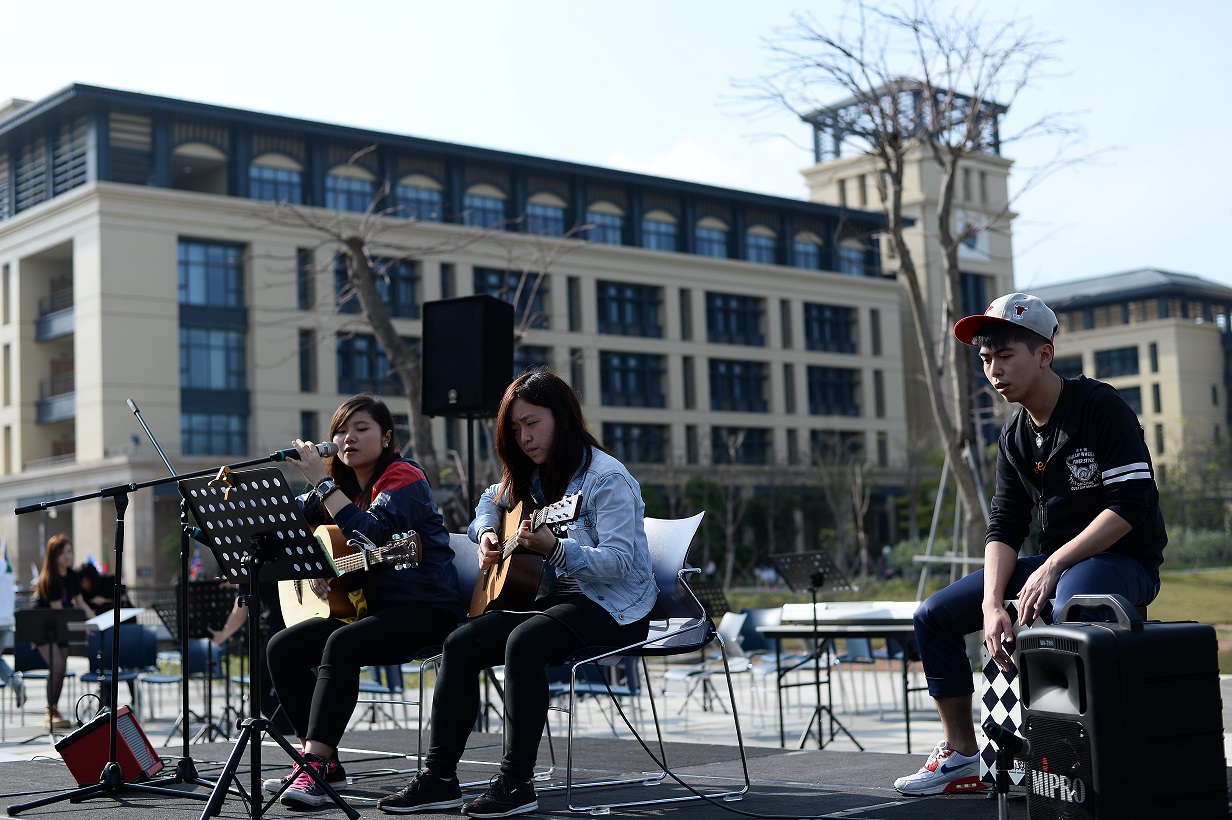
33743-81360
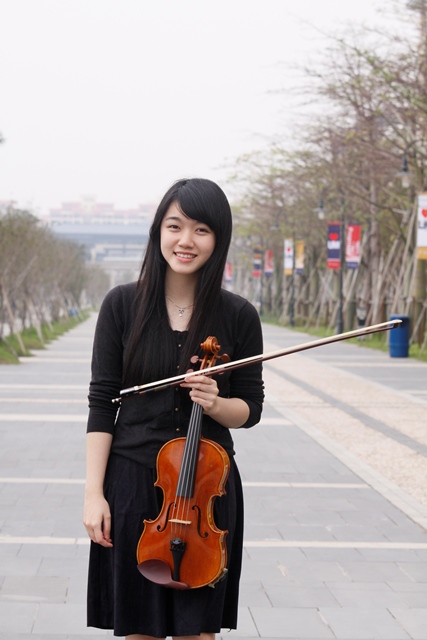
Ivy chooses the viola as her instrument because she thinks it’s a good match for her personality
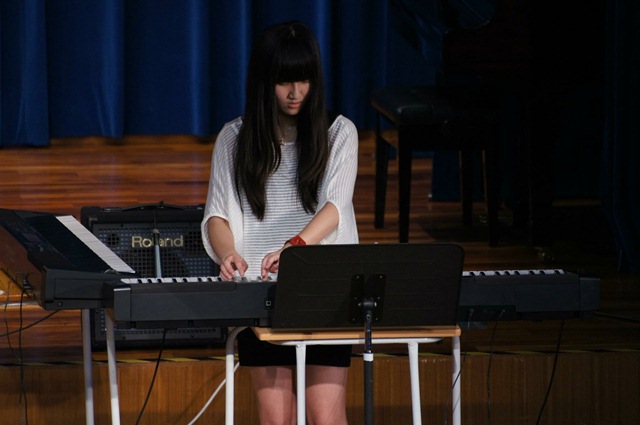
Silvestre has organised numerous events for students to showcase their musical talent

Jin plays an active role in creating a musical atmosphere on campus
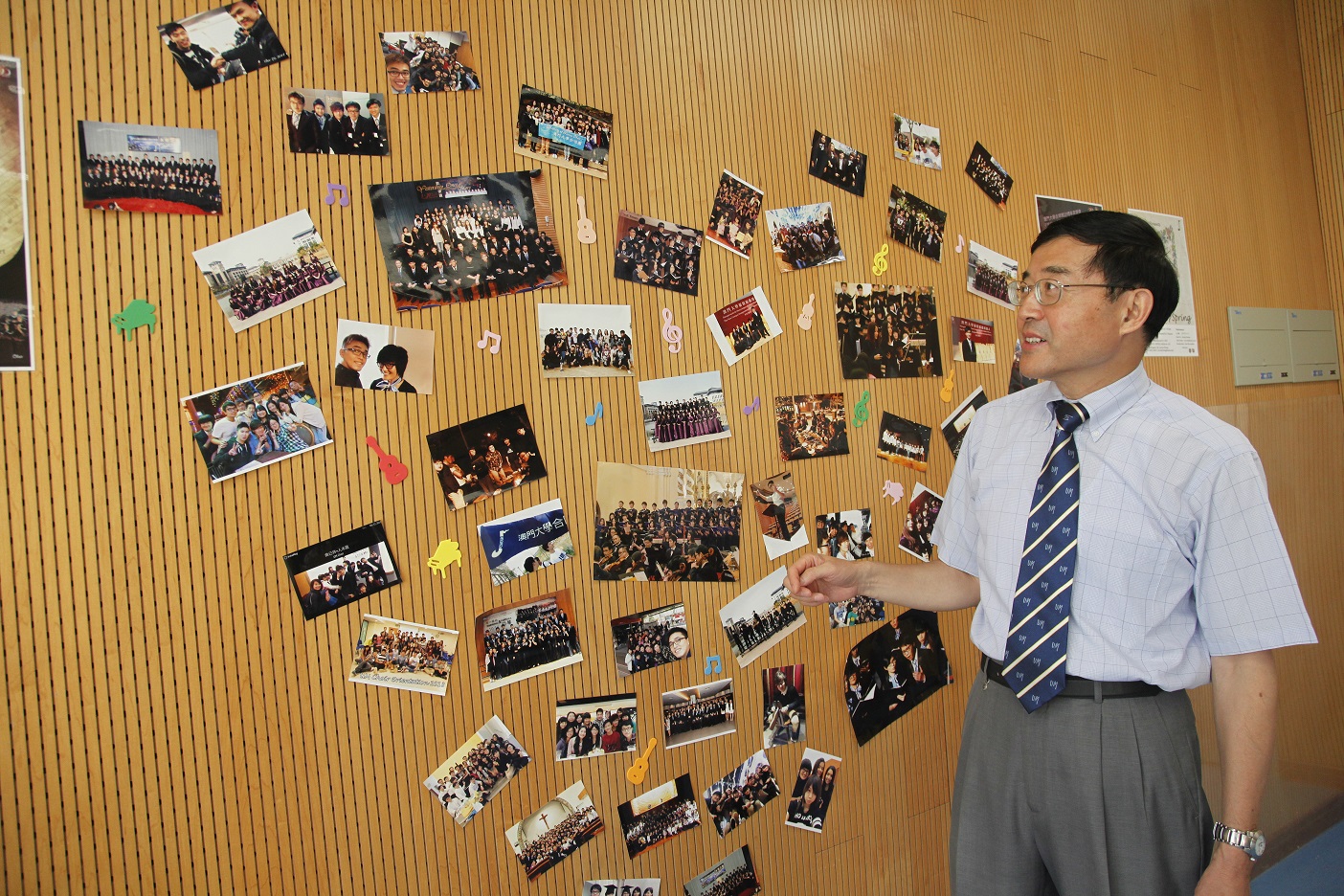
Dr Peter Yu is pleased to see that the campus has become a training ground for young musicians
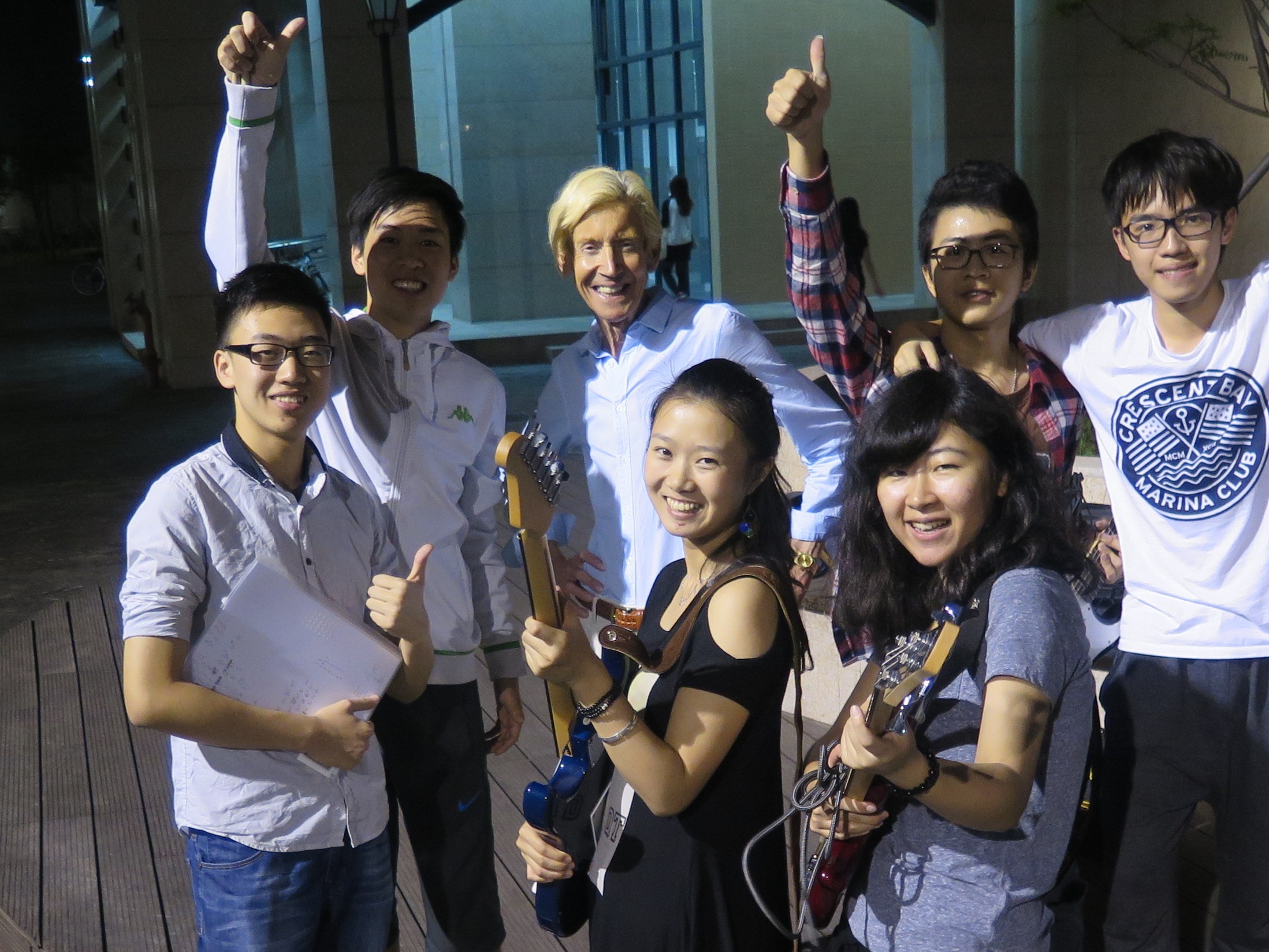
Prof Kevin Thompson (2nd from left
